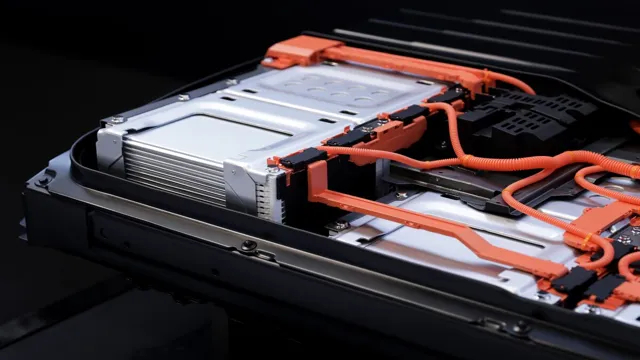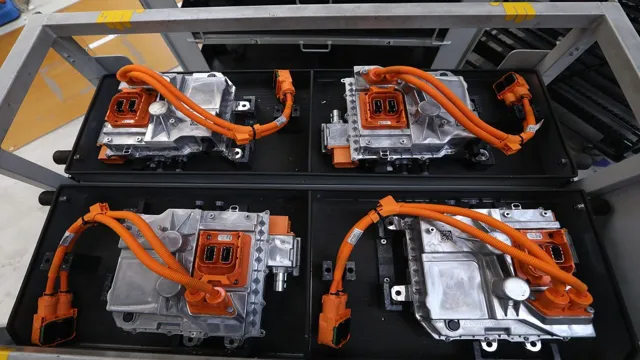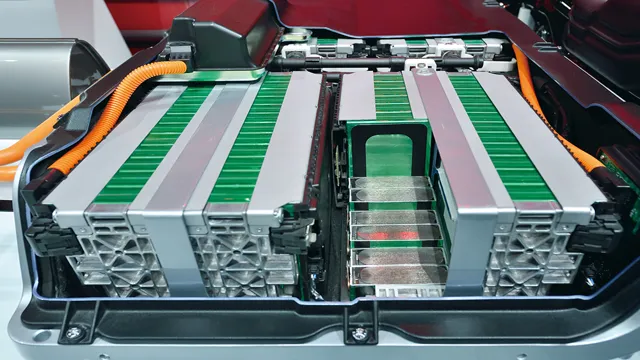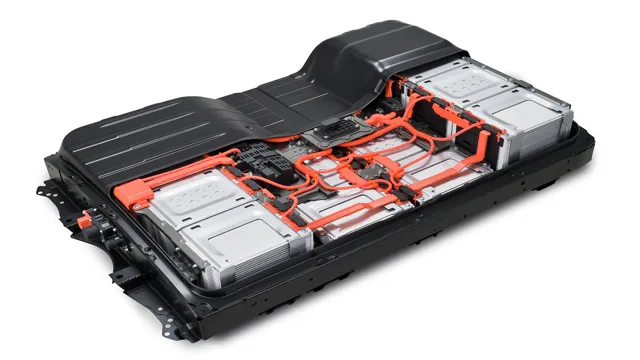Unveiling the Ethical Dilemma: Are Electric Car Batteries Truly Sustainable?
As the world turns its attention towards greener energy sources, electric cars have quickly become a popular alternative to traditional gasoline vehicles. However, the batteries that power these vehicles are not without controversy. With issues surrounding the ethical sourcing of materials used in their production and disposal processes, it’s important to consider the potential implications of widespread electric vehicle adoption.
Should we continue to prioritize the benefits of cleaner transportation at the expense of our ethical values? In this blog, we’ll explore the ethics of electric car batteries and the dilemmas that come with their production and use.
Definition and Overview
When it comes to electric car batteries, the question of ethicality arises. As we strive towards sustainable energy sources, it’s important to consider the environmental impact of the materials used in these batteries, such as lithium and cobalt. These minerals are often mined in developing countries with lax labor laws and dangerous working conditions.
Additionally, their extraction can cause ecological damage and contribute to water scarcity in some areas. However, steps are being taken to address these issues. Some manufacturers are working to improve the traceability of their materials, ensuring that they come from responsible sources.
Others are investing in the development of alternative battery technologies, such as solid-state batteries. While there is still work to be done, electric car batteries are becoming more ethical as the industry evolves. By supporting sustainable sourcing and innovation, we can help ensure that the transition to electric vehicles benefits both the environment and the global community.
Explaining the ethics of electric car batteries
Electric car batteries are becoming an increasingly popular topic of conversation, but many people are still unclear about the ethics surrounding them. Simply put, an electric car battery is a rechargeable device used to power an electric vehicle. These batteries use a variety of materials, including lithium, cobalt, nickel, and manganese.
However, concerns have been raised about the environmental impact of these materials, as well as the working conditions for those who mine and manufacture them. Additionally, the disposal of these batteries at the end of their life cycle can also pose environmental risks. Therefore, it is important to consider the ethical implications of electric car batteries and work towards finding ways to mitigate any negative impacts they may have.
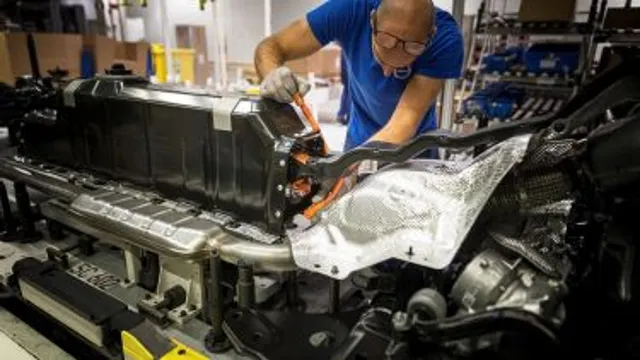
Environmental Impact
Are electric car batteries ethical? While electric vehicles are a cleaner alternative to conventional gasoline-powered cars, the production of their batteries still raises ethical concerns. The mining of lithium and other minerals required for battery production has been linked to environmental damage and human rights violations in countries like the Democratic Republic of the Congo. Additionally, the disposal of electric car batteries creates a potential risk of toxic waste contamination.
However, efforts are being made to mitigate these issues. Some companies are sourcing materials from ethical mines and implementing programs for responsible recycling of batteries. Ultimately, the ethical impact of electric car batteries depends on how they are produced, used, and disposed of, and the responsibility falls on both manufacturers and consumers to ensure that they are contributing to a more sustainable future.
Comparing electric car batteries with traditional car batteries
When it comes to the environmental impact of electric car batteries, there are different opinions. Some argue that producing these batteries puts a strain on the environment due to the mining of rare earth metals, the chemicals used in the production process, and the disposal of batteries. However, others point out that the overall impact of electric car batteries is lower than traditional car batteries over their entire life cycle.
This is because electric car batteries do not emit harmful pollutants or greenhouse gases during use, while traditional car batteries contribute to air and water pollution. Additionally, electric car batteries are recyclable, and efforts are being made to improve their recycling rates. Overall, while electric car batteries do have some environmental challenges, they tend to have a lesser impact than traditional car batteries, and the industry is actively working to address these challenges.
Discussing the carbon footprint of electric car batteries
Electric car batteries have been touted as a solution to reduce greenhouse gas emissions and ultimately help combat climate change. However, there’s a catch – the manufacturing and disposal of these batteries can have a significant environmental impact. The process of extracting raw materials like lithium and cobalt for battery production can have adverse effects on local ecosystems and communities.
Additionally, the production process can be energy-intensive and generate greenhouse gas emissions. While electric cars have lower emissions during their lifetime compared to traditional gasoline cars, their production can generate a significant carbon footprint. It’s important to consider the entire life cycle of electric car batteries and develop sustainable practices to minimize their environmental impact.
As we transition towards a more sustainable future, we need to ensure that our efforts are not causing harm in other areas.
Supply Chain
Are electric car batteries ethical? It’s a question that’s been gaining more and more attention in recent years, and for good reason. The production of electric car batteries requires a significant amount of materials, including minerals such as lithium, cobalt, and nickel, some of which are sourced from countries with questionable labor practices. In addition, the mining and disposal of these materials can have adverse environmental impacts.
However, many electric car manufacturers have taken steps to ensure that their supply chains are ethical, with some even working to create closed-loop systems where batteries are recycled and reused. Additionally, the use of electric cars can significantly reduce carbon emissions and other pollutants, helping to mitigate the impacts of climate change. Ultimately, the choice to use an electric car battery is a personal one, but by supporting manufacturers who prioritize ethical practices and sustainable supply chains, we can help ensure that the vehicles we drive have a positive impact on the world around us.
Exploring the social responsibility of electric car battery mining
The supply chain of electric car battery mining is a critical aspect of the social responsibility that needs to be addressed. The process of mining minerals such as cobalt, nickel, and lithium requires a complex supply chain that often involves multiple countries and companies. This means that any negative impact of mining operations such as human rights violations, environmental damage, and unsafe working conditions need to be identified and resolved at every stage of the supply chain.
One major challenge is that the burstiness of demand for electric cars has led to a rush in the mining sector to extract more minerals in a short period of time, which can lead to hazardous and unsustainable mining practices. Therefore, a transparent and sustainable supply chain that prioritizes human and environmental well-being is crucial in ensuring that electric car batteries are produced ethically and responsibly.
Examining the labor and human rights issues of electric car batteries
When you think of electric cars, the first thing that comes to mind is probably the environmental benefits. However, there are also labor and human rights issues associated with the production of electric car batteries. The supply chain of electric car batteries is incredibly complex, involving multiple countries and companies.
Unfortunately, there have been reports of poor working conditions and exploitation of workers in some parts of the supply chain. Cobalt, a key component in many electric car batteries, is often mined in dangerous conditions, with child labor being a major issue in some areas. While some companies have taken steps to address these issues, such as implementing due diligence programs, there is still much work to be done to ensure that the production of electric car batteries is ethically and sustainably sourced.
It’s important for consumers to be aware of these issues and to demand ethical and sustainable practices from the companies they purchase from.
Alternative Solutions
The ethical implications of using electric car batteries are a hotly debated topic. While the idea of using electric vehicles to reduce our carbon footprint seems appealing, some argue that electric car batteries are not ethically sound due to their reliance on rare earth minerals. These minerals are often mined in developing countries, where labor standards and environmental regulations are lax.
However, it’s important to note that there are alternative solutions to this problem. For instance, researchers are actively exploring ways to develop batteries without using rare earth minerals, such as sodium-ion batteries. Additionally, recycling programs for lithium-ion batteries are becoming more widespread, reducing the need for new mining operations.
By employing these alternative solutions, we can work towards a more sustainable and ethical future for electric vehicles.
Suggesting sustainable alternatives to electric car batteries
Alternative Solutions While electric cars are a great step forward in reducing carbon emissions, their batteries can actually be quite harmful to the environment. Fortunately, there are some alternative solutions that could be just as effective in powering our vehicles. One promising option is hydrogen fuel cell technology, which works by converting hydrogen gas into electricity.
Another possibility is solar power, which can be used to recharge electric car batteries or directly power the vehicle itself. There are also biofuels, such as ethanol or biodiesel, which could be used to power cars instead of fossil fuels. It’s important to explore these alternative solutions and find the most sustainable and environmentally friendly options for our transportation needs.
By continuing to innovate and invest in clean energy technology, we can work towards a more sustainable future for generations to come.
Presenting eco-friendly options to traditional car batteries
Modern-day car batteries are usually lead-acid, which is not only toxic but also poses a significant threat to the environment. Fortunately, there are now more eco-friendly alternatives to traditional car batteries. One option is lithium-ion batteries, which are lighter and more efficient than lead-acid batteries.
They are also recyclable, which makes them a more sustainable choice for a power source. Another alternative is nickel-metal hydride (NiMH) batteries, which emit fewer toxic fumes compared to lead-acid batteries. They are commonly used in hybrid cars and are also recyclable.
These eco-friendly options provide car owners with a sustainable solution that reduces their carbon footprint. By using these environmentally-friendly car batteries, not only are we helping to create a more sustainable future, but we are also preserving the planet for the next generation to enjoy.
Conclusion
After much consideration and research, it’s clear that the question of whether electric car batteries are ethical is a complex one. On one hand, they offer a more environmentally-friendly alternative to traditional gas-powered cars. On the other hand, the production and disposal of these batteries can have negative impacts on the environment and communities.
Ultimately, the key to ethical electric car batteries lies in responsible production and disposal practices, as well as continued advancements in sustainable technology. So while the answer may not be a clear-cut yes or no, we can all agree that striving towards a more ethical and sustainable future is a noble goal – whether we’re behind the wheel of an electric car or not.”
FAQs
What are the ethical concerns surrounding electric car batteries?
Some ethical concerns regarding electric car batteries include the environmental impact of their production and disposal, the human rights concerns related to mining materials used in their production, and potential inequalities in access to electric vehicle technology.
How are electric car battery manufacturers addressing ethical concerns?
Many electric car battery manufacturers are taking steps to address ethical concerns by using more sustainable and ethical sourcing practices for raw materials, designing batteries for extended use and reuse, and implementing responsible disposal and recycling processes.
Are electric car batteries more ethical than traditional car batteries?
While electric car batteries may have fewer emissions during use than traditional car batteries, they still raise ethical concerns related to their production, sourcing, and disposal. However, efforts are being made to mitigate these concerns in the electric vehicle industry.
What role do consumers play in promoting ethical electric car battery practices?
Consumers can play a significant role in promoting ethical electric car battery practices by making more conscious purchasing decisions, supporting companies with transparent and ethical sourcing practices, and advocating for greater environmental and social responsibility in the electric vehicle industry.
